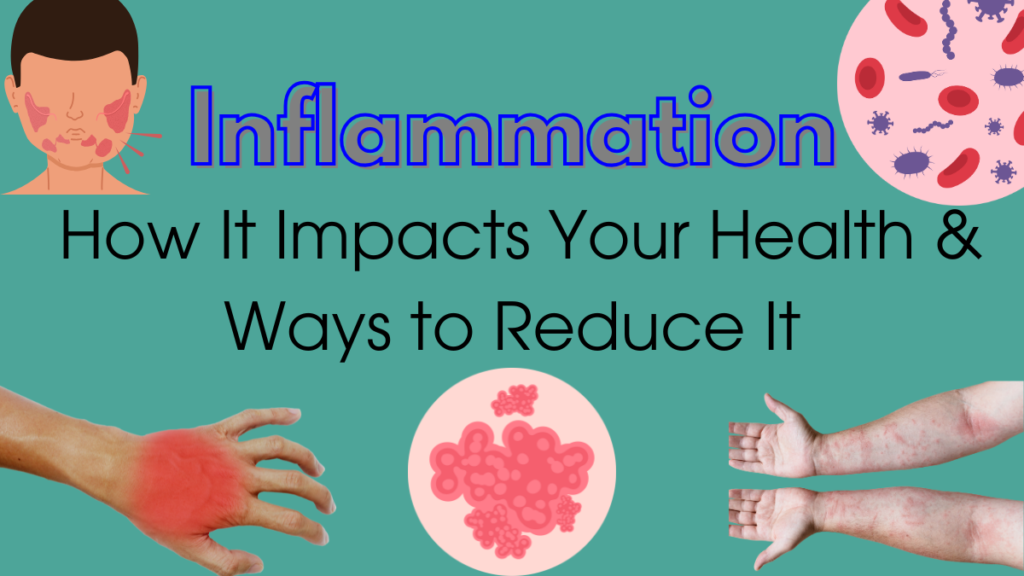Inflammation : Impacts Your Health
We’ve all experienced it: the redness and swelling around a scraped knee, the throbbing heat of a sprained ankle, or the ache of a sore throat. These are all signs of inflammation—your body’s natural defense system kicking into gear. But what happens when this protective response doesn’t shut off? Suddenly, inflammation isn’t a hero anymore—it becomes a silent villain linked to chronic diseases like heart disease, diabetes, and arthritis. Let’s explore what inflammation really is, how it affects your health, and practical steps you can take to keep it in check.

What Is Inflammation? The Good, the Bad, and the Chronic
Inflammation is your immune system’s first responder. When you’re injured or sick, your body releases white blood cells and inflammatory chemicals like cytokines to protect and heal damaged tissue. This acute inflammation is short-term and vital—it’s why a cut heals or a cold eventually fades.
But there’s another side to this story: chronic inflammation. Unlike its helpful cousin, chronic inflammation simmers quietly in the background, often for years. It’s like a faulty alarm that never stops ringing, damaging healthy cells and tissues over time. Research links this persistent state to conditions like:
- Heart disease
- Type 2 diabetes
- Autoimmune disorders (e.g., rheumatoid arthritis, lupus)
- Alzheimer’s disease
- Certain cancers
The tricky part? Chronic inflammation often flies under the radar. You might not notice symptoms until it’s already contributing to bigger health issues.
How Chronic Inflammation Sabotages Your Health
Imagine your body as a busy city. Acute inflammation is like a construction crew fixing a pothole—messy but necessary. Chronic inflammation, however, is like construction crews tearing up every street indefinitely. The chaos disrupts daily life, leading to wear and tear everywhere.
Here’s how it impacts key areas:
- Heart Health: Chronic inflammation damages blood vessels, promoting plaque buildup and increasing heart attack risk.
- Brain Function: Inflammatory markers are found in higher levels in people with depression, brain fog, or neurodegenerative diseases.
- Digestive System: Conditions like IBS or Crohn’s disease are closely tied to gut inflammation.
- Joints: Persistent inflammation erodes cartilage, causing pain and stiffness in arthritis.
Video Credits
Even subtle signs—like fatigue, frequent infections, or stubborn belly fat—can hint at an overactive inflammatory response.
What Fuels Chronic Inflammation? Common Culprits
Lifestyle and environmental factors often keep the inflammatory fire burning. Top triggers include:
- Diet: Sugar, refined carbs, fried foods, and processed meats spike inflammatory markers.
- Stress: Chronic stress raises cortisol levels, which can dysregulate immune responses.
- Sleep Deprivation: Poor sleep disrupts healing processes and increases inflammation.
- Sedentary Habits: Lack of movement slows circulation and promotes inflammatory fat storage.
- Toxins: Smoking, alcohol, and environmental pollutants burden the body’s detox systems.
Genetics play a role too, but lifestyle choices are often the biggest lever we can pull.
How to Reduce Inflammation: 7 Science-Backed Strategies
The good news? You can calm chronic inflammation with simple, sustainable changes. Here’s how:
1. Embrace an Anti-Inflammatory Diet
Focus on whole, nutrient-dense foods:
- Fruits & Veggies: Berries, leafy greens, and tomatoes are rich in antioxidants.
- Healthy Fats: Avocados, olive oil, and fatty fish (like salmon) provide omega-3s.
- Herbs & Spices: Turmeric, ginger, and garlic have natural anti-inflammatory properties.
- Fiber: Whole grains, beans, and legumes feed gut bacteria that reduce inflammation.
Avoid: Processed snacks, sugary drinks, and trans fats.
2. Move Your Body Regularly
Exercise isn’t just for weight loss—it lowers inflammatory markers like CRP (C-reactive protein). Aim for 150 minutes of moderate activity weekly (think brisk walks, yoga, or cycling).
3. Prioritize Sleep
Poor sleep elevates inflammatory cytokines. Create a calming bedtime routine and aim for 7–9 hours nightly.
4. Manage Stress Mindfully
Chronic stress fuels inflammation. Try meditation, deep breathing, or journaling. Even 10 minutes a day can help reset your stress response.
5. Stay Hydrated
Water flushes toxins and supports lymphatic function. Add lemon or cucumber for an extra antioxidant boost.
6. Limit Toxins
Reduce alcohol, quit smoking, and choose natural cleaning/products to minimize chemical exposure.
7. Consider Supplements
Curcumin (from turmeric), omega-3s, and vitamin D have strong anti-inflammatory effects. Always consult a doctor first.
Key Takeaways & Next Steps
Inflammation isn’t inherently bad—it’s all about balance. By adopting an anti-inflammatory lifestyle, you’re not just reducing disease risk; you’re investing in long-term energy, mental clarity, and vitality.
Ready to take action?
- Start with one small change, like adding leafy greens to meals or taking a daily walk.
- Share this article with a friend to spread the knowledge!
- Subscribe to our newsletter for more science-backed health tips.
Your body is your lifelong home—treat it with care, and it’ll thank you for decades to come.
A balanced plate of anti-inflammatory foods including salmon, leafy greens, berries, and nuts.
Found these tips helpful? Share your favorite anti-inflammatory recipe in the comments below, and don’t forget to subscribe for more wellness insight











